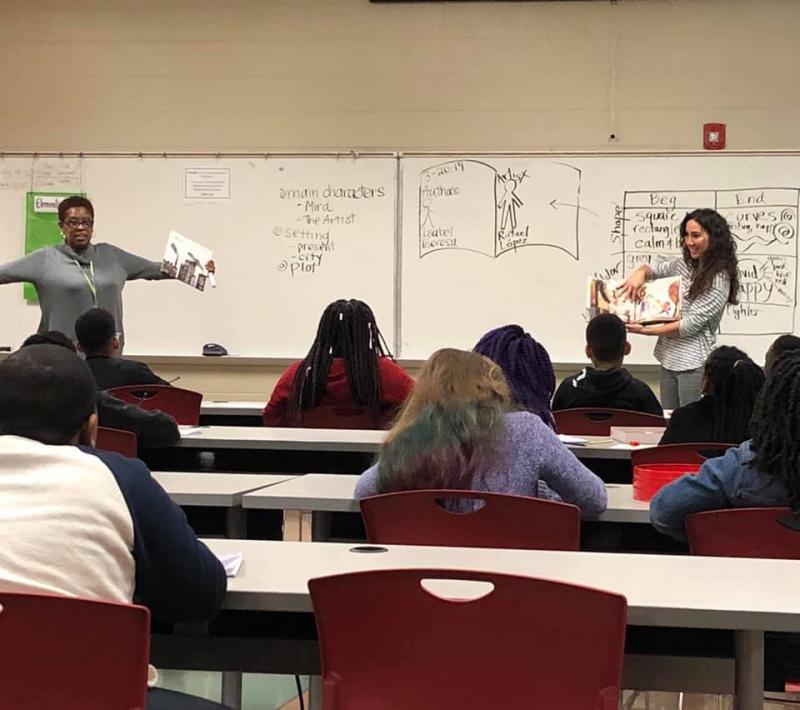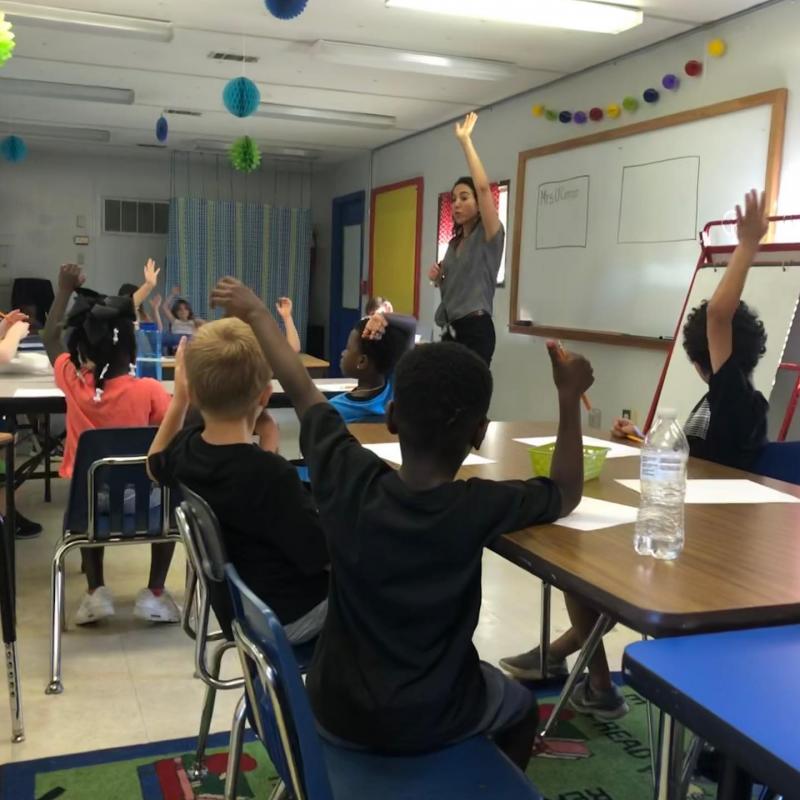New Grant Spotlight: The pARTners Project

Photo courtesy of the Arts and Humanities Council of Tuscaloosa. Teaching artist Ruth O'Connor and fourth grade teacher Linda Hargrove co-lead a visual art/ELA arts integration lesson at The Alberta School of Performing Arts in Tuscaloosa, Alabama. The pARTners Project will use the Arts Endowment award to develop a plan to increase access to arts education.
In its name and its mission, the pARTners Project emphasizes collaboration.
The project, a partnership between the West Alabama and Greater Birmingham Arts Education Collaboratives, aims to address inequalities in arts access in West-Central Alabama, with a special focus on pre-K through 12th grade students in rural areas still feeling the effects of segregation. It is a recent recipient of an Arts Education Collective Impact grant from the National Endowment for the Arts.
“Our essential question for this project is: how can a regional resource center best support its community?” said Deanna Sirkot, Executive Director of the Greater Birmingham Arts Education Collaborative.
Since 2018, the two collaboratives have been committed to direct-service programs, professional development for teachers and teaching artists, and arts education advocacy at the regional level. Through those efforts, both collaboratives have gotten to know and learn from their communities, but this project will offer the chance to dig deeper. Utilizing the expertise of community members, the pARTners Project will identify strategic, systemic approaches to increase arts education access in West-Central Alabama.
“We’ve noticed in the past couple years in our communities that we have unique and overlapping challenges,” Sirkot said of the greater Birmingham and Tuscaloosa areas.
“The need comes down to an inequality in access to arts education, and we’ve noticed over the past few years that a lot of these inequalities come back to what Alabama has experienced historically with segregation, so a lot of the areas that have minimal access have had minimal access for a long time,” she said.
According to the Arts and Humanities Council of Tuscaloosa, less than 40 percent of schools in Alabama currently offer arts education programming, and rural areas are most affected. Rather than dictate to rural communities how best to address that gap, the pARTners Project will collaborate with those communities to ensure all students benefit from greater access.
Shannon McCue, director of the West Alabama Arts Education Collaborative, said she and Sirkot felt by combining forces, their two collaboratives could maximize on both areas in order to better serve them – a guiding principle of collective impact.
“I think it’s really easy when you’re thinking about any sort of program or project to just get into your own bubble with your own people,” she said. “You’re just one-sided. You don’t have an expertise in everything; people in your communities who you might not even think to ask will have expertise in other areas.”

Photo courtesy of the Arts and Humanities Council of Tuscaloosa. Teaching artist Ruth O'Connor leads a visual art/social science arts integration lesson for first graders at Myrtlewood Elementary School in Fosters, Alabama.
The pARTners Project is the culmination of years of investment from the Arts Endowment in arts education and collective impact in Alabama. In 2015, the Arts Endowment supported the development of a statewide arts education plan from the Alabama Alliance for Arts Education. This plan was used to leverage financial support from the state legislature to create the Artistic Literacy Consortium Initiative, which supports collaborative arts education projects throughout the state (The North Alabama Arts Education Collaborative, located in Huntsville, also received an Arts Education Collective Impact grant in this round of grants).
“We’ve been a consistent funder in supporting [Alabama] to move the work forward, and it’s wonderful to see how far they’ve come,” said Ayanna Hudson, the Arts Endowment’s Arts Education Director, noting that The pARTners Project has the potential to serve as a model for other rural communities.
While the ultimate goal of the pARTners Project is to increase access to arts education, the project will not begin with program implementation. The pARTners Project has created a two-year, three-phase plan to identify partners and conduct research. Phase one will be to bring together members of the community to form teams, both local and regional, who will help determine the project’s next steps.
“We know a lot about our areas and our programs, but we really want to know more,” McCue said. “We want to know the best way to move forward from people who are living and working in these areas. These voices need to be at the table too.”
The pARTners Project will recruit team members from surrounding colleges and universities, including the University of Alabama and Stillman College, a historically Black college. Other community members, including activists and civic leaders, will also be able to join these teams. Sirkot said that the pARTners Project will leverage their networks while also utilizing grassroots outreach to ensure that all areas and groups have a seat at the table.
Once the teams are formed, they will work with researchers on determining data collection and analysis. The last phase of the project will be to develop strategies to close the arts education access gap. As with the research stage, Sirkot and McCue said they would like to step back and allow their partners to lead the way forward in developing plans.
“We want this to be driven by the community, for the community,” McCue said.
“I think that’s what it comes down to,” Sirkot added. “They’re the experts in their own community and can really drive what the vision for their locale should be.”




